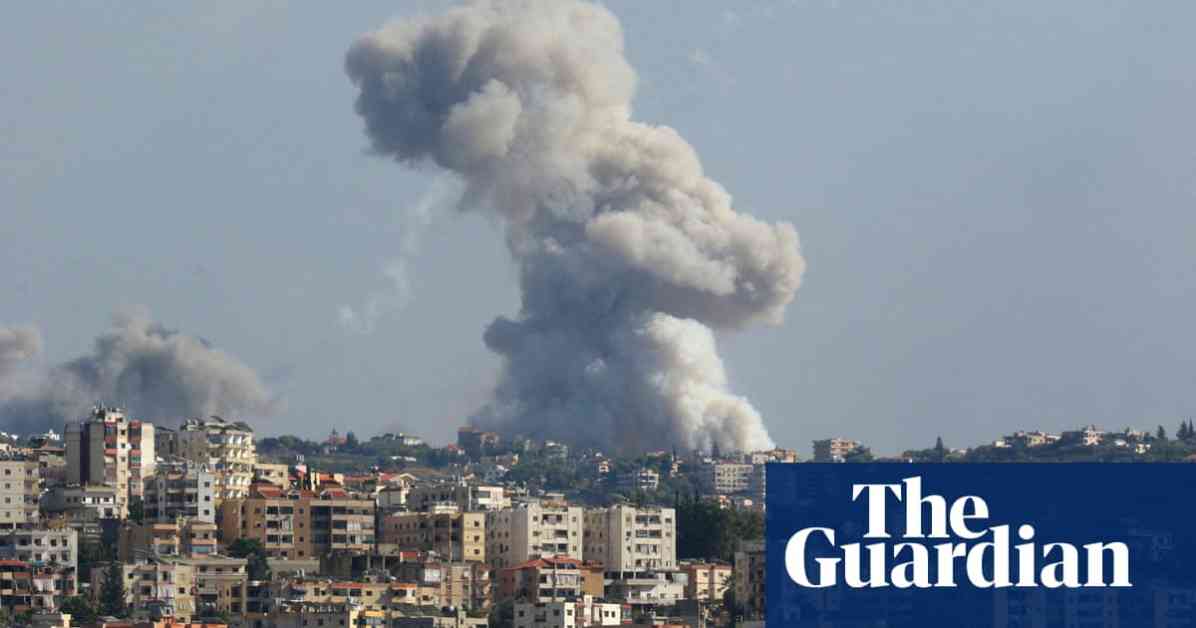Israeli Airstrikes Leave Devastation in Lebanon
The aftermath of a wave of Israeli airstrikes on alleged Hezbollah targets has left Lebanon reeling, with the country recording its highest daily death toll since the end of the civil war in 1990. According to Lebanon’s health ministry, at least 492 people have been killed and 1,645 injured in the attacks.
The airstrikes, which targeted south Lebanese towns and villages, forced tens of thousands of people to flee towards the capital, Beirut. This marked Israel’s most intense barrage in nearly a year of cross-border clashes, with sirens also sounding in the northern Israeli city of Haifa. The Lebanese health ministry reported that among those killed, 35 were children and 58 were women.
Israeli Prime Minister Benjamin Netanyahu stated that the military’s actions were aimed at changing the “security balance” along the northern border. “I promised we would change the security balance, the balance of power in the north – and that is exactly what we are doing,” Netanyahu affirmed during a security meeting.
Continued Conflict and Escalation
Israel Defense Forces chief of staff, Lt Gen Herzi Halevi, revealed that the military was preparing for “next phases” in Lebanon, targeting combat infrastructure that Hezbollah had been building for the past two decades. The IDF reported hitting over 1,300 Hezbollah targets in the previous 24 hours, marking its largest attack on the militant group since the Gaza war in October.
In response, Lebanon launched about 35 rockets towards the Safed area of Israel, with some landing in open areas near the community of Ami’ad. The situation escalated further when the US President Joe Biden, currently attending the United Nations General Assembly, expressed his efforts to de-escalate the conflict. Biden stated, “My team is in constant contact with their counterparts, and we’re working to de-escalate.”
The Israeli defense minister, Yoav Gallant, warned Lebanese residents in Beirut and other areas to evacuate their residences and distance themselves from buildings holding Hezbollah weapons. Gallant emphasized that the actions would continue until the northern Israeli residents were safely returned to their homes.
Humanitarian Crisis and Displacement
As the airstrikes intensified, roads leading out of south Lebanon became jammed with traffic as people fled the relentless bombing. Areas that had previously served as safe zones for displaced individuals suddenly found themselves in the crosshairs of the Israeli military.
Videos circulated on social media depicting collapsed buildings and bombs falling from the sky, capturing the fear and devastation experienced by the Lebanese population. Hassan Dabouk, the head of Tyre’s union of municipalities, expressed concern over the continuous bombing, stating, “The airstrikes aren’t stopping, airstrike on airstrike. People are scared.”
The UN peacekeeping body in Lebanon (Unifil) relocated its civilian staff from south Lebanon to the north as a precautionary measure due to the escalating conflict. The organization expressed grave concern for the safety of civilians in southern Lebanon amidst the intense Israeli bombing campaign.
In response to the ongoing crisis, individuals and organizations in Lebanon mobilized efforts to provide housing for displaced people. Faten Jebai, a journalist from south Lebanon, spearheaded initiatives to connect displaced individuals with available rooms or discounted housing options.
Regional Implications and Calls for De-Escalation
The conflict between Israel and Hezbollah has raised fears of an all-out war, with both sides engaging in escalating strikes and counterstrikes. The recent clashes have exacerbated tensions in the region, with Hezbollah vowing to continue its strikes in solidarity with Palestinians and Hamas.
Amidst the turmoil, international leaders and organizations have called for de-escalation to prevent further devastation and loss of life. The UN peacekeeping body in Lebanon emphasized the need for a ceasefire to avoid far-reaching and devastating consequences for civilians on both sides of the border.
As the situation continues to unfold, efforts to mitigate the conflict and ensure the safety of civilians remain a top priority for the international community. The repercussions of the ongoing violence in Lebanon serve as a stark reminder of the urgent need for peace and stability in the region.












